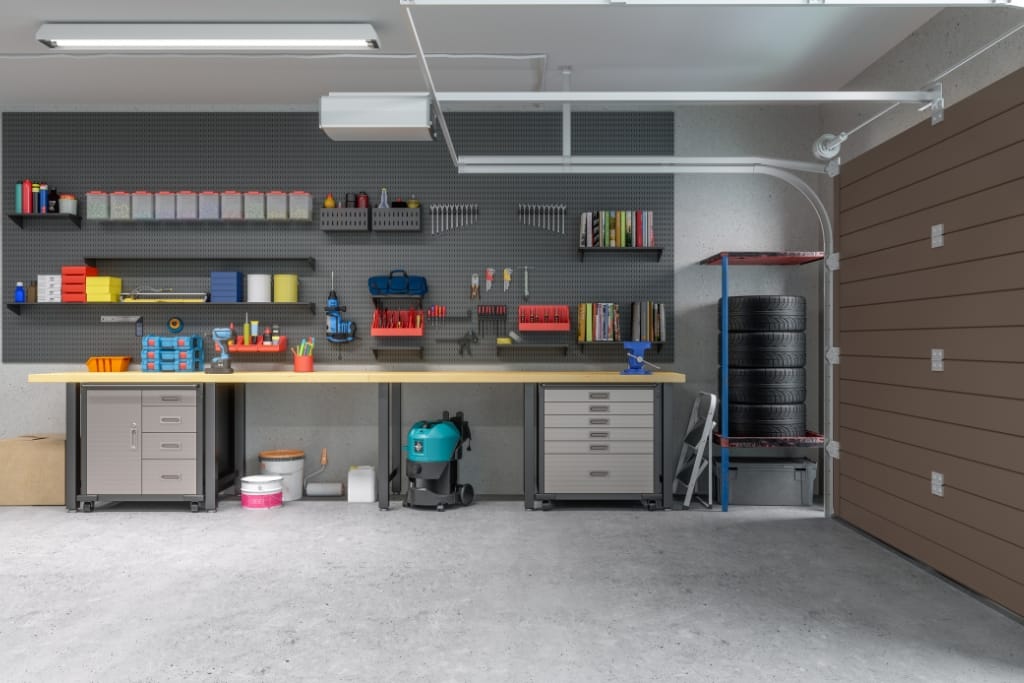Your garage is more than just a space for your car and excess storage. It is an integral part of your home, and as such, it's essential to keep it free from unwanted guests - pests.
Pests, from rodents to insects, can cause significant damage and even pose health risks.
As a trustworthy guide to home maintenance, we've put together a list of 10 effective tips to help you fortify your garage against these tiny invaders.
These practical insights will not only safeguard your belongings but also contribute to a healthier and safer living environment.
1)) Clear The Clutter
Clutter in the garage provides hiding spots and shelter for pests. Keep your garage clutter-free by organizing your belongings and removing items you no longer use.
By creating more space in the garage, you will eliminate potential hiding spots for pests.
Tips for Efficient Clutter Clearance:
- Establish Sorting Criteria: Define what counts as clutter in your garage. This could be items not used in the past year, broken tools, or outdated supplies. Having clear criteria will streamline the decluttering process.
- Organize in Zones: To maintain an organized garage, create zones for different types of items. For instance, you could have a zone for gardening tools, one for automotive supplies, and another for sports equipment.
- Invest in Storage Solutions: Consider using shelves, pegboards, or bins to keep your items neatly arranged. Good organization helps in keeping pests away as they can't hide or breed in well-maintained spaces.
Maintaining a clutter-free garage is a decisive step towards a pest-free environment.
A clean, well-organized space not only discourages pests but also enhances the usability of your garage.
A little effort in regular organization can save you from the predicament of a pest infestation.
2)) Keep Food Stuffs Sealed
Open food containers in the garage attract rodents, ants, and other pests. Ensure that all foodstuffs, including pet food, are in airtight containers.
If possible, avoid storing food in the garage.
Practical Guidelines for Sealing Food Stuffs:
- Use Airtight Containers: Invest in high-quality, airtight containers for storing food items. These containers are designed to keep pests out and preserve the freshness of the food.
- Regularly Check for Damages: Ensure the integrity of your storage containers by regularly checking for cracks or holes. Replace any damaged containers immediately to prevent pest access.
- Avoid Storing Perishables: If possible, avoid storing perishable food in the garage. These items are particularly attractive to pests and can quickly become a breeding ground if not stored properly.
Effectively sealing foodstuffs in your garage is paramount in preventing a pest invasion.
By using airtight containers, regularly inspecting for damages, and avoiding the storage of perishables, you can significantly minimize the risk of attracting pests.
Prevention is always easier (and less costly) than dealing with an infestation.
3)) Regularly Inspect And Maintain The Garage
Regular inspection and maintenance help to identify pest issues early on. Look out for holes, cracks, and gaps that pests can use to gain access.
Seal these openings using silicone caulk, steel wool, or other pest-proof materials. Don’t forget to replace any worn-out weather stripping.
Essential Steps for Regular Garage Inspection and Maintenance:
- Identify and Seal Openings: Regularly inspect your garage for any cracks, holes, or gaps that pests could use as entry points. Seal these openings as soon as possible using pest-proof materials, such as silicone caulk or steel wool.
- Check the Weather Stripping: Pay special attention to the weather stripping around your garage doors and windows. If it's worn out or damaged, replace it promptly to prevent pests from squeezing in.
- Look for Signs of Pests: Keep an eye out for tell-tale signs of pests, such as droppings, nests, or chewed wiring. Early detection can help you address a potential infestation before it gets out of hand.
Regular inspection and maintenance of your garage play a key role in keeping it pest-free.
By being vigilant about potential entry points, maintaining the integrity of weather stripping, and staying alert for signs of pests, you can prevent infestations from taking root.
A well-maintained garage not only deters pests but also contributes to the overall longevity of the space.
4)) Install And Use Door Sweeps
A door sweep is a simple and cost-effective way to prevent pests from entering garage doors.
Install a door sweep on the bottom of the door to seal gaps between the door and the floor. This way, pests won’t find it easy to slither through.
Essential Tips for Installing and Using Door Sweeps:
- Choose the Right Type: Door sweeps come in various materials such as rubber, silicone, or aluminum. Choose the one that best suits your door type and local weather conditions.
- Ensure Proper Fit: Measure your door's width carefully to ensure the door sweep fits properly. An ill-fitting door sweep will not effectively seal the gap and keep pests out.
- Regular Maintenance: Check your door sweep periodically for any wear and tear. Replace it promptly if damaged to ensure continuous pest prevention.
The proper installation and use of door sweeps is a cost-effective method to fortify your garage against unwanted pests.
By choosing the right type, ensuring a proper fit, and maintaining the door sweep regularly, you create an effective barrier that pests find hard to breach.
It's often the simplest measures that make a significant impact on pest control.
5)) Shut The Doors
Pests such as spiders, snakes, and rodents can enter through open garage doors.
Make it a habit to shut the door whenever you enter or leave the garage.
Furthermore, check that the door is correctly shut to prevent pests from sneaking in.
Key Measures for Keeping Garage Doors Shut:
- Develop a Routine: Make it a habit to close the garage door every time you enter or leave. Creating a routine minimizes the chances of accidentally leaving the door open.
- Install an Automatic Door Closer: If you often forget to close the door, consider installing an automatic door closer. It will shut the door after a predetermined amount of time, reducing the risk of pests entering.
- Perform Regular Checks: Occasionally, doors may appear closed when they aren't fully shut. Regularly check the alignment and make any necessary adjustments to ensure a tight seal.
Closing the garage door is a simple yet effective way to keep pests at bay.
By nurturing a habit of shuttering doors, installing automatic door closers, and regularly checking the door's alignment, you can significantly reduce the risk of pests infiltrating your garage.
Ultimately, the key to pest-free spaces is consistent attention to these seemingly small but crucial details.
6)) Use Pest Repellents
An effective pest repellent is an additional measure to keep pests out of the garage.
There are many types of chemical and natural repellents you can use. Ensure you use pesticides that won’t harm users or the environment.
Effective Tips for Using Pest Repellents:
- Select Environmentally Friendly Options: When choosing pest repellents, opt for ones that are eco-friendly and do not cause harm to users or the environment. Many natural repellents are both effective and sustainable.
- Read and Follow Instructions: Each repellent has specific instructions for use. Always read the label carefully to ensure you're using it correctly and maximizing its effectiveness.
- Rotate Repellents: Pests may develop resistance to a repellent if it's used continuously. Consider rotating different types of repellents to maintain their effectiveness.
The strategic use of pest repellents can be a powerful tool in your defense against garage infestations.
By choosing environmentally friendly options, adhering to the provided instructions, and varying your repellents, you can maximize their effectiveness and maintain a pest-free environment.
The goal is not just to repel pests, but to do so in a manner that's safe for you and the environment.
7)) Store Items Off The Floor
Storing items on the floor provides the perfect hiding spot for pests. Instead, use shelves, and cabinets, or hang items on the wall to keep them off the floor.
Practical Strategies for Storing Items Off the Floor:
- Invest in Storage Solutions: Use shelving units, cabinets, or wall-mounted hooks to store items. Not only does this keep items off the floor, but it also helps in organizing your garage better.
- Utilize Ceiling Space: If your garage ceiling is high, consider installing overhead storage racks. This is a great way to utilize unused space and keep items off the floor.
- Regular Decluttering: Regularly declutter your garage to avoid piling up items on the floor. Dispose of unnecessary items and store essentials properly on shelves or cabinets.
Storing items off the floor in your garage is an efficient way to deter pests from taking refuge there.
By investing in various storage solutions, utilizing the ceiling space, and decluttering regularly, you can effectively limit the availability of hiding spots for pests.
This strategy not only aids in pest control but also contributes to a more organized and accessible garage space.
A clean and well-arranged garage is less inviting to pests and more pleasant for you.
8)) Check For Water Leaks
Pests are attracted to moisture; therefore, check for water leaks in the garage. Fix any dripping taps or damaged pipes to minimize moisture in the garage.
Essential Steps in Checking for Water Leaks:
- Regular Inspections: Make a habit of inspecting your garage for any signs of water leaks. Look for damp spots on the walls, floor, or ceiling and any unusual increase in humidity.
- Repair Leaks Promptly: Upon detection of a leak, address it immediately. Whether it's a dripping tap or a leaking pipe, prompt repair prevents moisture build-up that can attract pests.
- Consider a Dehumidifier: If your garage is prone to humidity, consider installing a dehumidifier. This device can help maintain a dry environment that is less appealing to pests.
Regularly checking for and promptly fixing water leaks is a crucial step in maintaining a pest-free garage.
By conducting routine inspections, addressing leaks immediately, and considering the use of a dehumidifier, you can effectively manage the moisture levels in your garage.
A dry environment is less attractive to pests, helping you maintain a clean, comfortable, and pest-free space.
9)) Inspect Outdoor Surroundings
Pests often nest in nearby bushes, twigs, and piles of debris outside the garage.
Ensure you clear any debris around your garage and trim bushes and trees that come into contact with the garage’s walls.
Crucial Tips for Inspecting Outdoor Surroundings:
- Maintain Clean Surroundings: Keep the area around your garage clean. Regularly remove fallen twigs, leaves, and other debris that can provide shelter for pests.
- Trim Vegetation: Keep trees and bushes trimmed, especially those coming into contact with your garage. Pests can use overgrown vegetation as a bridge to access your garage.
- Check for Nests: Be vigilant for any signs of pest nests in the outdoor area around your garage. If you find any, seek professional pest control advice to eliminate them safely and effectively.
Regular inspection and maintenance of the outdoor surroundings of your garage can significantly contribute to keeping it pest-free.
By maintaining a clean environment, trimming overgrown vegetation, and vigilantly checking for pest nests, you are reducing the opportunities for pests to establish a presence near your garage.
Pro-Tip: Investing in yard maintenance tools not only enhances the aesthetic appeal of your home but also plays a crucial role in keeping pests at bay. Regular maintenance of your yard can disrupt the life cycle of pests, preventing their proliferation. Tools such as lawnmowers, trimmers, and leaf blowers help manage overgrown vegetation that serves as a breeding ground for pests. By investing in quality yard maintenance tools, you're taking a proactive stance in maintaining a healthy, pest-free environment for your home.
The battle against pests begins even before they enter your garage; a well-maintained exterior can serve as an excellent first line of defense.
10)) Maintain Hygiene
Maintain a good level of hygiene in your garage. Sweep and mop the floor regularly and properly dispose of waste.
By keeping a clean garage, you eliminate potential food sources and shelter for pests.
Key Tips to Maintain Hygiene in Your Garage:
- Regular Cleaning: Sweep and mop your garage floor regularly to keep it clean, minimizing the chances of attracting pests.
- Proper Waste Disposal: Ensure that waste is properly disposed of and not left in the garage. Any leftover food or trash can serve as a potential food source for pests.
- Organize Your Space: Keep your garage well-organized and clutter-free. This makes it easier to clean and leaves fewer places for pests to hide.
Maintaining impeccable hygiene is integral to a pest-free garage. Regular cleaning, proper waste disposal, and good organization practices are all crucial elements of this.
A clean and well-organized garage is less likely to attract pests, making your space safer and more pleasant to use.
By adopting these hygiene practices, you are creating a hostile environment for pests and a welcoming one for yourself.
Conclusion
Keeping a garage pest-free is a task that requires consistent effort and attention to detail.
From storing items off the floor to maintaining impeccable hygiene, every step contributes to a clean, comfortable, and pest-free environment.
Regular inspections of both the interior and exterior of your garage, coupled with prompt action to repair leaks and remove potential pest shelters, can drastically reduce the chances of a pest infestation.
Prevention is always better than cure, and the time and effort invested in maintaining a pest-free garage will pay off in the long run, safeguarding your space from unwanted visitors and potential damage.
Related Articles and Guides:
- How To Get Rid Of Rats In The Garage
- How To Get Rid Of A Possum In Your Garage
- How To Get Rid Of Fleas In The Garage
- How To Get Rid Of Lizards In The Garage
- How To Get Rid Of Raccoons In The Garage
- How To Get Rid Of Flies In The Garage
- How To Get Rid Of Spiders In The Garage
- How To Get Rid Of Roaches In The Garage
- How To Get Rid Of Crickets In The Garage
- How To Get Rid Of Moths In The Garage
- How To Get Rid Of Ants In A Garage
Download Our Free E-book!







